A time of renewal, exploration, and self fulfillment. Past Review
By Lisa Dong (University of California - Riverside) - abroad from 07/14/2019 to 11/08/2019 with
Lincoln University: New Zealand - Direct Enrollment & Exchange
Honestly, my time experience abroad was the best if not the best time of my life. I met so many people from across the world, I discovered what I wanted to focus on in my career, I bonded so co closely with nature, and my culinary skills also improved. This was such a peaceful and fun time- an experience that I would not trade for anything. I loved the people and professors. The classes were amazing and I practiced real-world field methods and techniques. My GIS class was amazing and the resources we had were great.
Review Photos
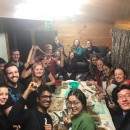
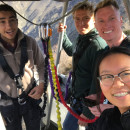
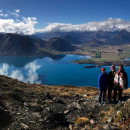
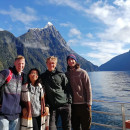
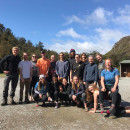
Personal Information
| How much international exposure did you have prior to this program? | 1 month - 6 months |
Review Your Program
|
* Overall educational experience
Academic rigor, intensity, resources, etc. |
The courses that I had were all amazing. There were multiple field trips for my courses in which I was able to experience the real world and apply what I have learned. One of these field trips was two nights and three days where we were to come up with our own research proposals. It was amazing. In addition, this was where I was first exposed to GIS which is what I plan to focus on, along with the environment, for my future. What amazed me was that all of the computers had the most updated GIS software. This lead to a very efficient and productive learning process with little to no technical issues. When I returned back to my University in California, I was very disappointed that the computers were not all updated with the software even though we bought the license. All of the professors at Lincoln University are kind and humble. We call them by their first names and I even played cards against humanities with one of them. They are passionate in their fields and learning from them was an extraordinary experience. Lincoln University aims to connect the work that the students do with the real world. For example, my GIS class worked on a project for the local governement and for another class. |
|
* Host Country Program Administration
On-site administration of your program |
Great!! |
|
* Housing:
How satisfied were you with your living arrangements? |
I lived in a flat with three other students. The flat was like a mini cabin because the walls were all wood and we had a fireplace as well!! We were in close proximity to many other flats and it honestly felt like I was on vacation 24/7. We did not have a dryer, but we did have a lot of lines to dry our clothes outside. This helped me bond more with nature and live a more sustainable lifestyle. |
| * Food: |
I was vegan so I cooked a lot rather than eating out. When I did eat out, I would eat chips (fries). Their chips are amazing- crispy on the outside and soft on the inside. In addition, the spices in New Zealand are of high quality and low prices. My culinary skills definitely improved and I also became a fan of curries. The Indian restaurants here have delicious food and there was also an awesome vegan restaurant that I went to a few times. |
|
* Social & Cultural Integration:
How integrated did you feel with the local culture? |
I felt like I was at home. The people were wonderful and nice. The environment was rejuvenating and natural. It was an amazing experience bonding with the local native people (Maori), the Pakeha (New Zealanders of European Descent), and other international students. |
|
* Health Care:
How well were health issues addressed during the program? |
Honestly, I never really got sick. I never went to the doctor or hospital for treatment or anything. I did have to take a lot of vaccinations prior to the program which I thought was unnecessary. New Zealand is definitely safer than the United States- safety-wise and disease-wise. |
| * Safety: |
My host city was the safest place that I have ever been to. We leave our doors, bicycles, etc unlocked and nothing was ever stolen. I forgot my laptop outside once. It was there the next day. |
| If you could do it all over again would you choose the same program? |
Yes
I would choose the same program again for sure. The country is a great role model for sustainable living and environmental protection. They have good relations with their native people, unlike the United States. The Maori actually influence environmental and government decisions. Their art is celebrated and their culture is integrated throughout the Island. This program gave me courses that teach skills that are useful in the real-world. Their mission and intent on helping make the world a better place shows throughout the entire school and Island. |
Finances
|
* Money: How easily were you able to live on a student's budget?
(1 = not very easy/$200+ on food & personal expenses/week, 2.5 = $100/week, 5 = very easily/minimal cost) |
Personally, I ate a lot and I liked to cook for others too which was why my food expenses were kind of high. I often held flat dinners where at least 10-15 students would gather in my flat and we would all eat and talk together. These memories were priceless. |
| Not including program expenses, about how much money did you spend on food and other expenses each week? | 100-150 |
| Do you have any general money-saving tips for future study abroad participants? | Future study abroad participants shouldn't have any problem-saving money. I just eat a lot and I like to share my food with a lot of other people. I would recommend you to cook more rather than eat out. |
Language
| * Did your program have a foreign language component? | No |
Direct Enrollment/Exchange
| * Did you study abroad through an exchange program or did you directly enroll in the foreign university? | Exchange |
Other Program Information
|
* Where did you live?
Select all that apply |
|
|
* Who did you live with?
Select all that apply |
|
|
* Who did you take classes with?
Select all that apply |
|
| About how many local friends did you make that you will likely keep in touch with? |
A Look Back
| * What did you like most about the program? |
|
| * What could be improved? |
|
| * What do you know now that you wish you knew before going on this program? | N/A |
Reasons For Studying Abroad
| To help future students find programs attended by like-minded individuals, please choose the profile that most closely represents you. |
The Academic or LinguistYou went abroad with specific academic goals in mind; the program credentials and rigor of your coursework abroad were very important to you. You had a great time abroad, but never lost sight of your studies and (if applicable) were diligent with your foreign language study. Good for you! |
Individual Course Reviews
| Course Name/Rating: |
ECOL103, Ecology I: New Zealand Ecology and Conservation |
| Course Department: | Agriculture and Life Sciences |
| Instructor: | Tim Curran |
| Instruction Language: | English |
| Comments: | Since this class was on the lower-division side, I would not say that it was challenging. However, the skills that I acquired from this class are valuable. We went on a few field trips to study the ecology of the area and we utilized the skills that we learned on these field trips. We even went on a ferry to an Island!! I would say that this class is very beneficial to learning plant identification and terms, bird identification and more. The teacher was very knowledgeable and passionate. I would participate in class- oftentimes more than in my home institution. We had online quizzes that were targeted toward us learning rather than grades and we had final exams that tested the skills that we learned in addition to basic knowledge/terms/vocabulary. |
| Credit Transfer Issues: | I just accepted that I was not going to get any of my classes accepted as major classes. I had this show up on my UC transcript as an elective instead. |
| Course Name/Rating: |
ECOL293, Field Ecology Methods |
| Course Department: | Agriculture and Life Sciences |
| Instructor: | Jon Sullivan |
| Instruction Language: | English |
| Comments: | Jon was our "senior" lecturer, but this course was actually taught by 4 professors that were skilled in different areas. These four areas were mammal monitoring/management, bird monitoring/management, invertebrate monitoring/management, and plant monitoring/management. Our professors were all specialized in what they taught they were so passionate too. They were always prepared and we would have fieldwork every week to every other week. We would also have lab work where we would analyze the data that we collected. I participated more in this class than I typically do in my home institution. We did have research proposals, homework, etc. However, we did not have busy work. The "homework" was a continuation of data management from our lab work. This class has taught me so many monitoring/managing/restoration methods. I would not give up this class for anything. We actually went on a two night and three-day field trip to design our own research project. There were no extra fees and they even accommodated to my own diet. I gave them a list of food that I wanted and they purchased everything for me. Their kindness and warmth were unbelievable. |
| Credit Transfer Issues: | I accepted the fact that it was going to be difficult to count any of my courses as major upper-division electives. I just accepted my courses as "elective" courses. Come knowing that you are not here to satisfy requirements. Come knowing that you are here to gain skills that are beneficial to your future. |
| Course Name/Rating: |
ERST 310, GIS and Applications in Natural Resource Analysis |
| Course Department: | Environment, Science and Design |
| Instructor: | Crile Doscher |
| Instruction Language: | English |
| Comments: | This was definitely a challenging course if you do not have any background experience with GIS. I was the only exchange student that took this course. My professor was definitely knowledgeable and well-prepared. We had two group projects and one individual project in addition to labs. Our projects were real-world based in that we helped the local government and another class. If you want to learn and gain skills pertaining to GIS, take this class knowing that it will have a steep learning curve. We did not get a chance to go on a field trip, but that is okay. |
| Credit Transfer Issues: | I accepted that it was going to be difficult to count my classes as upper-division major elective courses so I accepted this course as an "elective" course. Come not for fulfilling your requirements, but for learning new skills for your future. |
| Course Name/Rating: |
MAST319, Te Kaitiakitanga (Maori Environmental Management) |
| Course Department: | Environment, Society and Design |
| Instructor: | Hirini Matunga |
| Instruction Language: | English, some Maori |
| Comments: | This was definitely a challenging course because we used a lot of vocabulary in the Maori language. There is a lot of information to learn and this class definitely has a steep learning curve for those who have no background knowledge of the Maori language. However, the information that we learned in regards to how the Maori do Environmental Management, Design, Policy, etc was amazing. The knowledge can definitely be incorporated into environmental planning in other countries. I was able to learn how to make environmental decisions and also understand the role that the native people played in government decisions. If I had the choice to go back in time, I would choose to take this course. It taught me a lot of applicable skills and considerations to make regarding environmental management and decision making. |
| Credit Transfer Issues: | I accepted that it was going to be difficult to make any of my classes count as upper-division major elective courses so I just counted all of my courses as elective courses. Do not come here expecting that the courses are going to fulfill your major requirements. Come here knowing that the skills and experiences that you gain will be priceless to your future. |








